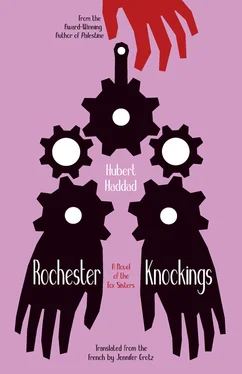But here was John D. Fox coming out of the saloon with bent knees, his wide-brimmed hat pulled down over his nose, with a rubbery neck characteristic of the fourth or fifth glass of whiskey. He staggered and, bumping into a barrel filled with rainwater, soon found himself sprawled on the dusty road. The marshal rushed over, containing his laughter.
“Damn barrel!” the farmer exclaimed, relying on a helping hand to get up. “Oh, it’s you, McLeann, many thanks. .”
“How about I walk you back?”
“Not tonight, I’ll be fine. Old Billy knows the way. . Listen, do you also believe in all that nonsense?”
“Go home and get some sleep, old Fox! And think how it’s only a matter of time before Mexico surrenders to the demands: the war is over! That’s no small amount of ghosts gone, no?”
He helped the drunken farmer get his foot in the stirrup and untied Old Billy from the drinking trough. The horse snorted and headed off with a confident step in the direction of Long Road.
McLeann studied the blue shadows on the roadside, then a heron flying over bodies of water and over the golden border of the hills. Barely distinct in the obscure night sky, the full moon unfastened itself from the roofs, with an even brighter star strung to it like a necklace. The only error of his life was to have mistaken Venus for a star. His own bright star had faded quickly in a bed of sky and then was extinguished at once, leaving him stupid with a trunk full of dresses. One becomes a marshal by chance, because of love or in spite of it, for having tracked a pair of coyotes or for swearing to oneself to be done with human society.
A holy trembler before God, and a good shot, came out of the saloon, reeling and zigzagging. The road didn’t seem big enough for him. It was Isaac Post, a learned man who ended up in Hydesville, an ex-telegraph operator for Western Union, dismissed for having confused the revolutionary system of the Bostonian Samuel Morse with that of a mechanical piano. Headed into the wind, he started to bellow like he had done most nights since his early retirement:
Oh my home it was in Kansas
And my past you shall not know
IV.Hast Thou Entered into the Treasures of the Snow
The winter that year was particularly bitter. Cold froze still waters. The ground became so hard that the corpse of an old man had to be stored in a communal granary behind the church. Snowstorms and tempests of wind quickly isolated Hydesville and nearby farms. The Rochester stagecoach hadn’t enlivened Long Road for at least three days. And no one ventured beyond the isolated barn, on the reservoir side, or the slaves’ path once built by blacks and the county convicts that left off at the hills’ base between the abandoned slate quarries and conifer forests. One could no longer see even the least convoy of French or Irish immigrants passing by en route to the West Coast: the gold rush was beginning to subside. Wolves and coyotes famished by the seal of ice approached dangerously close to farms, prowling around the sheepfold and barns despite the shots haphazardly fired by farmers numb with cold.
Her pretty blonde head turned toward a window, Miss Pearl was amazed, somewhere between fright and enchantment, by the swirls of snow that came crashing against the windows embroidered at their edges with scallops of frost. By turns it took the docile appearances of a big polar bear, or terrifyingly, of ghouls rising from a mass grave sprinkled with quicklime. But she was even more alarmed by turning back to the thin faces that were watching her, especially Kate in the front row, her owl’s eyes fixed on her, a vague smile wandering across her parted lips.
“Forgive me,” she said, “let’s resume now our lesson in moral instruction. Quickly take out your tablets, those who know how to write will note down all the proper names, the others will make a cross for each one. .”
The pastor’s daughter opened the old King James Bible inherited by her great grandfather. Blistered in places, blackened in others, it looked like bread overbaked by two laundrywomen at sea, or from a trailer fire during the time of emigration.
“There was a man in the land of Uz, whose name was Job; and that man was perfect and upright, and one that feared God, and eschewed evil. .”
Miss Pearl paused a moment, distracted by all these faces looking up at her. The iron stove was purring in the back of the classroom that had been allocated to the church by the municipality. Three farmers’ sons, among the better off, including a new seventeen-year-old boy, almost illiterate, who had registered mostly to learn more about managing the affairs of his widowed mother, seven girls, including the strange Kate and sometimes her sister Margaret, also new, but certainly more gifted than that simpleton Samuel: he was the only child of the High Point widow who had survived consumption, and his hair and clothes were always soaked, even in dry weather. Pearl was rather proud of having convinced so many Hydesville families to enroll their daughters, usually confined all winter to inside chores or at the Presbytery Dame School. Her argument, with its Biblical freshness, frightened the good cowherds suddenly visited by a glimmer of understanding: Those who don’t know how to read the Holy Scriptures will remain alienated from God, by the fact that the evil spirit blinds them! To learn to read and write is to guarantee access to His Blessing, without having to claim at the gates of Heaven that one is a happy simpleton. This obvious thesis — that the Puritans had completely gotten wrong — was convincing enough to include even the youngest ones. Why did it make her think of the brilliant Anne Bradstreet whose dear library and manuscripts were lost in a fire in the times of the Pilgrim Fathers, but, by divine grace, whose dear husband and flock of children were spared. What remained on Earth of the smoke released by the too-brilliant Anne Bradstreet’s burning poems?
Miss Pearl drove these thoughts away and returned to her Bible: “And the LORD said unto Satan, From whence comest thou? And Satan answered the LORD, and said, From going to and fro in the earth, and from walking up and down in it. And the LORD said unto Satan, Hast thou considered my servant Job?”
Seated at the corner of one of the long kitchen tables the schoolchildren huddled behind, Kate wrote “Job” in pointed letters, after “Satan,” “Lord,” “God,” “Uts or Uz.” She wondered if God was a proper name and why Miss Pearl was biting her lips while looking at the window’s white specters. So blonde that a sunbeam inflamed her, with eyes like star fruit and cheeks of a soft pink pallor, the pastor’s daughter seemed to her more beautiful than the snow covering the angelic curves of the hills.
“What world are you in, Katie?” the teacher asked, finally embarrassed by the fixity of her gaze.
She was aware of the youngest Fox sister’s sleepwalker-like absent-mindedness, which sometimes could be easily turned by the least thing into an agitation of the mind. Kate blushed and was smiling now as if to apologize.
“In no world, Miss Pearl, it’s the snow. .”
The other students, having lost their concentration, put down their chalk or their Birmingham metallic pens. Harriett Mansfield, the youngest from the horse ranch, Lily Brown who seemed at sixteen to have already lived several lives, two still innocent little geese-keepers, ten-year-old goat herders let free for a few hours of study, Samuel Redfield in the back of the room, his hair dripping, nodding his head in a silent laugh. That one she suspected of hiding painful secrets. Dressed in a pair of overalls with wide straps and dyed Genoan blue, the adolescent fidgeting oddly in his seat seemed to prefer the warmth of the stove than learning to read and write. She managed never to be alone with him in the classroom and turned her head when his eyes would grow wide while he opened that mouth with lips redder than a calf’s heart freshly sliced in two. Sundays at service, dressed in his late father’s heavy and broad black clothes, he voluntarily devoted himself to do the collection or pass out hymnbooks. The reverend assigned him even minor tasks with the ringing promise of a silver dollar on his birthday.
Читать дальше












